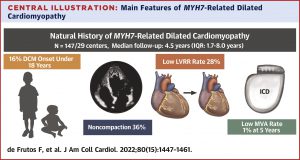Natural History of MYH7-related Dilated Cardiomyopathy
Dilated cardiomyopathy is a heart disease, where the main heart chamber (left ventricle) is enlarged and at the heart has reduced capacity to pump blood into the body. Dilated cardiomyopathy usually has symptoms like shortness of breath or swollen legs; in the more severe cases, it can also cause irregular heart beat and lead to unexpected death due to cardiac causes. Overall, it is estimated that up to one in two hundred and fifty adults (1/250) could suffer of this disease in Western countries.
Recent research on genetic (= related to parts of the DNA in cells) causes of dilated cardiomyopathy have enabled doctors to map which genes may be responsible for the disease and define personalized treatments that could work best for patients based on their individual characteristics. For example, we know that patients with a mutation in a specific gene (called LMNA) could be more subject to unexpected death due to arrhythmias and consequently we recommend an early implantation of a cardiac device (an implantable defibrillator) that can treat and correct irregular heart rhythm.
A change in another gene (called MYH7) is one of the most frequent causes of genetic dilated cardiomyopathy. Until now, researchers did not investigate this factor enough. In the study presented here, researchers collected information about 147 patients and family members with dilated cardiomyopathy connected with change in gene MYH7 evaluated at 29 hospitals from Europe and Australia; most of such hospitals belonged to the ERN GUARD-Heart Network. The researched have published their results in the Journal of the American College of Cardiology.
The results of the presented study show that around 20% of patients with a change in gene MYH7 started showing heart symptoms during infancy; this is different from other manifestations of the disease, where symptoms generally appear in adult age. The main heart chamber (left ventricle) in such patients appeared frequently spongy (as opposed to smooth and firm), but this factor did not affect the evolution of the medical condition. Patients did not respond well to drugs in terms of improvement of the pumping capacity of the heart; unexpected death due to cardiac arrythmias occurred in few cases, even among patients with a severe disease. We hope that this relevant information can guide doctors taking care of these families in their practice.
The figure shows a summary of the main findings.

Translated by Pablo Garcia Pavia, Madrid, Spain
de Frutos et al. J Am Coll Cardiol. 2022 80, 1447–1461.
